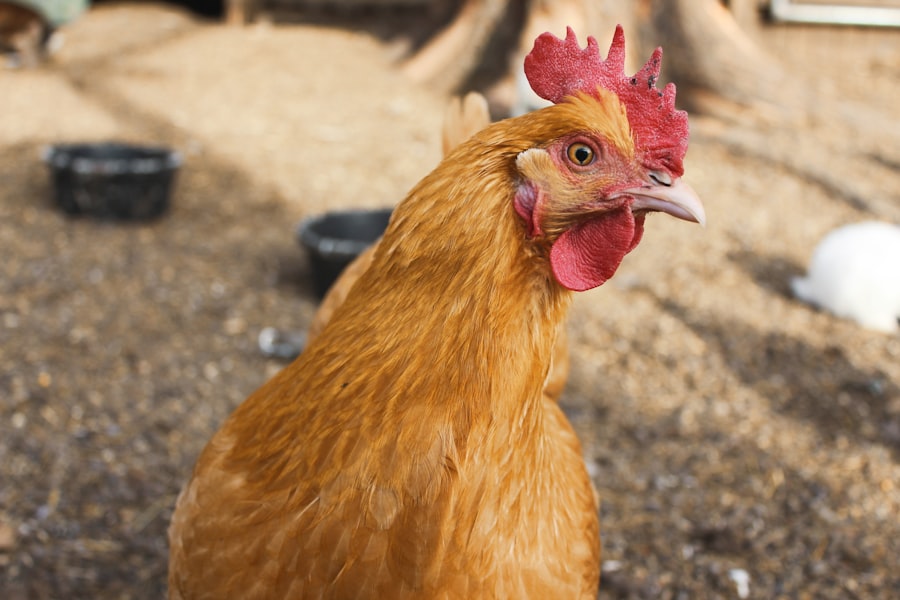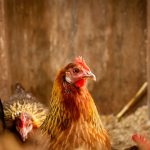Maintaining chickens on farms or in backyards offers numerous benefits, including the production of fresh eggs and meat, natural pest control, and organic fertilizer for gardens. However, a common challenge faced by chicken keepers is preventing chickens from accessing water troughs. Chickens are inherently inquisitive and may be drawn to water sources, which can result in water contamination and potential health hazards for the birds.
Furthermore, chicken presence in water troughs necessitates more frequent cleaning and maintenance, and may cause damage to the equipment. Implementing effective strategies to deter chickens from entering water troughs is crucial for ensuring a healthy and efficient poultry management system.
Table of Contents
Key Takeaways
- Chickens in water troughs can lead to contamination and health risks for other animals.
- Risks of chickens in water troughs include spreading diseases and reducing water quality.
- Methods for keeping chickens out of water troughs include building physical barriers and using deterrents.
- Building physical barriers such as covers and fences can effectively keep chickens out of water troughs.
- Using deterrents like motion-activated sprinklers and reflective objects can discourage chickens from accessing water troughs.
- Training chickens to stay away from water troughs can be achieved through positive reinforcement and consistent training.
- In conclusion, keeping chickens out of water troughs is essential for maintaining water quality and preventing the spread of diseases. Regular maintenance and monitoring are also important for long-term success.
Risks of Chickens in Water Troughs
Risks to Water Quality
Chickens are known to carry bacteria such as E. coli and Salmonella, which can contaminate the water and lead to potential health issues for the flock. In addition, the presence of chickens in the water trough can lead to an increase in algae growth, which can further contaminate the water and make it unpalatable for the chickens.
Increased Maintenance and Costs
The constant presence of chickens in the water trough can lead to increased maintenance and cleaning, as well as potential damage to the equipment. This can result in increased costs and time spent on maintaining the water source, which can be a burden for chicken owners.
Risks to Other Animals
Having chickens in the water trough can also lead to a decrease in water quality for other animals on the farm or in the backyard. If the water becomes contaminated with bacteria or algae, it can pose a risk to other livestock or pets that rely on the same water source. This can lead to potential health issues for other animals and increase the overall maintenance and cleaning required for the water trough.
The Importance of Keeping Chickens Out
Finding effective methods to keep chickens out of water troughs is crucial for maintaining a healthy environment for all animals on the farm or in the backyard.
Methods for Keeping Chickens Out of Water Troughs

There are several methods that can be used to keep chickens out of water troughs, ranging from building physical barriers to using deterrents and training techniques. Each method has its own advantages and disadvantages, and it’s important to consider the specific needs and environment of your chicken operation when choosing the best approach.
Building Physical Barriers
One effective method for keeping chickens out of water troughs is to build physical barriers around the trough. This can be done using materials such as wire mesh, fencing, or PVC piping to create a barrier that prevents chickens from accessing the water source. The height and design of the barrier will depend on the size and behavior of your chickens, as well as the specific layout of your water trough.
Building a physical barrier can be a long-term solution that requires minimal maintenance once installed, making it a cost-effective option for many chicken owners. Another option for building a physical barrier is to use a cover or lid on the water trough that prevents chickens from entering. This can be especially effective for smaller water troughs or those located in areas where it’s feasible to install a cover.
However, it’s important to ensure that the cover is secure and doesn’t pose any safety risks for the chickens or other animals on the farm.
Using Deterrents
In addition to physical barriers, using deterrents can be an effective method for keeping chickens out of water troughs. Deterrents can include visual or auditory stimuli that discourage chickens from approaching the water source. For example, placing shiny objects or reflective tape near the water trough can create visual disturbances that deter chickens from getting too close.
Similarly, using noise-making devices such as wind chimes or motion-activated alarms can startle chickens and discourage them from entering the area around the water trough. Another option for using deterrents is to apply taste or scent repellents around the water trough that are unpleasant to chickens. This can include natural substances such as citrus peels, vinegar, or hot pepper spray that create an unappealing environment for chickens.
However, it’s important to regularly reapply these repellents to maintain their effectiveness, which can require ongoing effort and resources.
Training Chickens to Stay Away

Using Positive Reinforcement Techniques
Training chickens to stay away from water troughs can be a more time-consuming but effective long-term solution. This method involves using positive reinforcement techniques to teach chickens to avoid the water source. For example, providing alternative sources of water such as nipple drinkers or separate watering stations can encourage chickens to seek out other options.
Creating Physical Barriers and Redirecting Behavior
Using treats or rewards to reinforce desired behavior, such as staying away from the water trough, can help train chickens over time. Another aspect of training involves creating physical barriers or deterrents and then consistently redirecting chickens away from the water trough when they attempt to access it. This requires patience and consistency but can ultimately lead to a change in behavior for the flock.
Ongoing Effort and Reinforcement
It’s important to note that training chickens may require ongoing effort and reinforcement, especially if new chickens are introduced to the flock or if there are changes in the environment that could affect their behavior.
Conclusion and Final Tips
In conclusion, keeping chickens out of water troughs is an important aspect of maintaining a healthy and efficient chicken operation. The presence of chickens in water troughs can pose several risks, including contamination of the water source, increased maintenance and cleaning, and potential health issues for both the chickens and other animals on the farm or in the backyard. By using methods such as building physical barriers, using deterrents, and training techniques, chicken owners can effectively keep their flock out of water troughs and create a safe and clean environment for their animals.
When choosing a method for keeping chickens out of water troughs, it’s important to consider the specific needs and environment of your chicken operation. Each method has its own advantages and disadvantages, so it’s essential to choose an approach that aligns with your resources and goals. Additionally, it’s important to regularly assess the effectiveness of your chosen method and make adjustments as needed to ensure long-term success.
With careful planning and implementation, chicken owners can successfully keep their flock out of water troughs and maintain a healthy environment for their animals.
If you’re looking for more tips on keeping chickens, you might want to check out this article on poultrywizard.com. It offers advice on how to build a chicken coop that will keep your chickens out of the water trough and provide them with a safe and comfortable living space.
FAQs
Why is it important to keep chickens out of water troughs?
Chickens can contaminate the water with their droppings, feathers, and dirt, leading to potential health risks for both the chickens and other animals that may drink from the trough.
How can chickens be kept out of water troughs?
One way to keep chickens out of water troughs is to install a cover or lid over the trough to prevent them from accessing the water. Another method is to place the water trough in an area that is not easily accessible to the chickens, such as on a raised platform.
What are the potential health risks of allowing chickens to access water troughs?
Allowing chickens to access water troughs can lead to the spread of diseases and parasites, as well as contamination of the water with bacteria and other pathogens. This can result in illness and decreased overall health for the chickens and other animals that may drink from the trough.
Are there any other benefits to keeping chickens out of water troughs?
Keeping chickens out of water troughs can also help to maintain the cleanliness and quality of the water, reducing the need for frequent cleaning and maintenance of the trough. It can also prevent water wastage and ensure that the water remains accessible to other animals.
Meet Walter, the feathered-friend fanatic of Florida! Nestled in the sunshine state, Walter struts through life with his feathered companions, clucking his way to happiness. With a coop that’s fancier than a five-star hotel, he’s the Don Juan of the chicken world. When he’s not teaching his hens to do the cha-cha, you’ll find him in a heated debate with his prized rooster, Sir Clucks-a-Lot. Walter’s poultry passion is no yolk; he’s the sunny-side-up guy you never knew you needed in your flock of friends!







